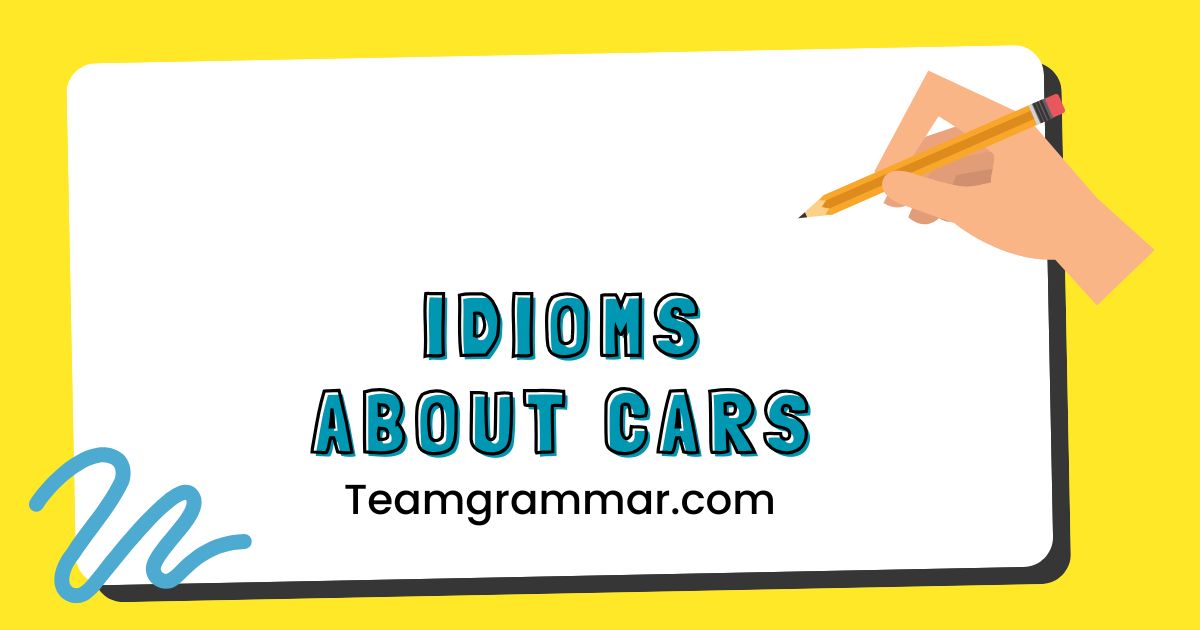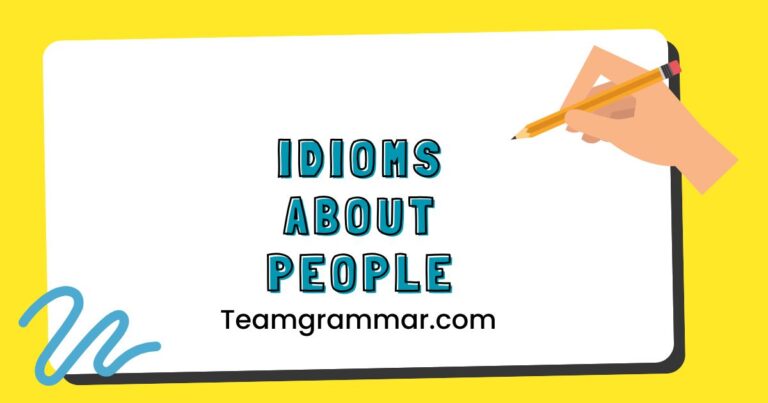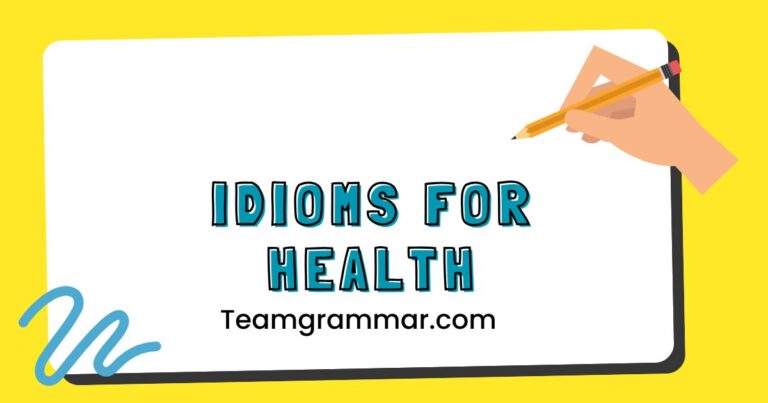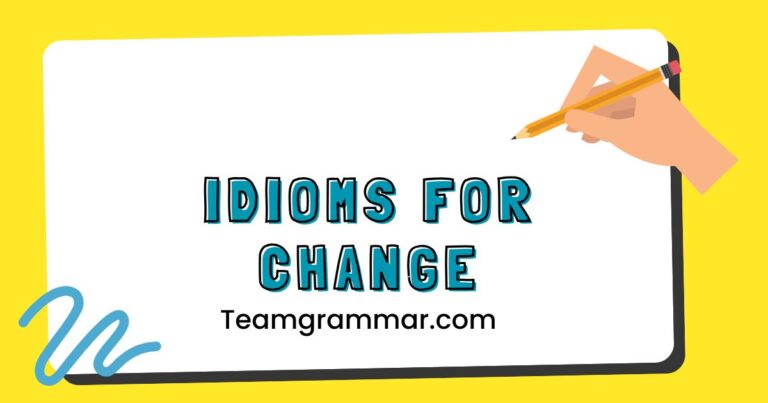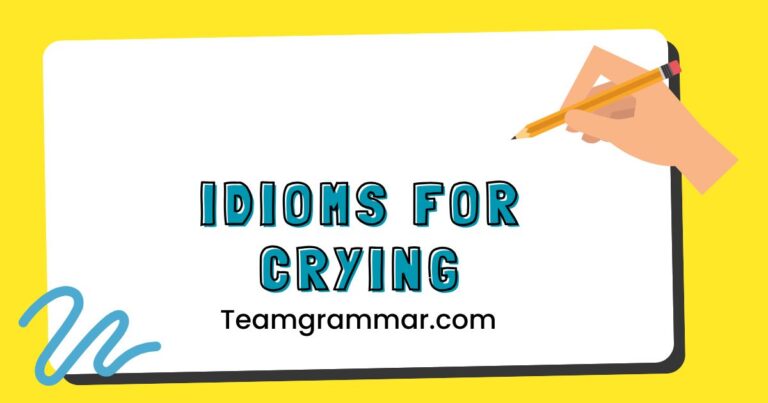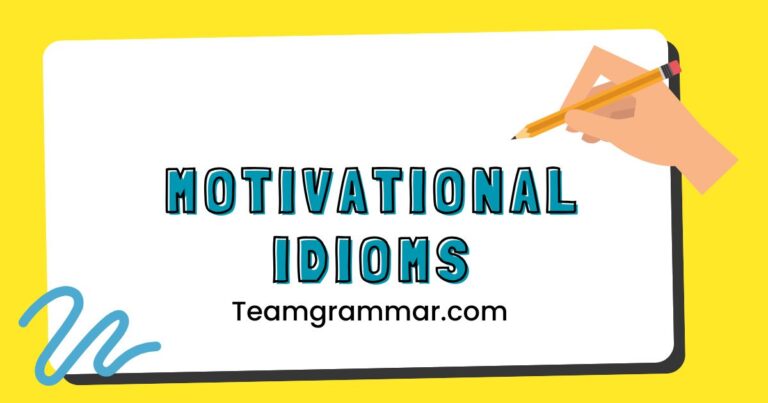49 Idioms About Cars: Driving Your English Fluency
Understanding idioms is crucial for mastering English. They add color and depth to conversations, making your language sound more natural and expressive.
Idioms related to cars are particularly common, reflecting the significant role cars play in modern life. This article will explore a variety of car-related idioms, providing clear definitions, examples, and usage rules.
Whether you’re a beginner or an advanced learner, this guide will help you confidently incorporate these idioms into your everyday English.
Table of Contents
- Introduction
- Definition of Idioms
- Structural Breakdown of Car Idioms
- Types or Categories of Car Idioms
- Examples of Car Idioms
- Usage Rules for Car Idioms
- Common Mistakes with Car Idioms
- Practice Exercises
- Advanced Topics
- FAQ Section
- Conclusion
Definition of Idioms
An idiom is a phrase or expression whose meaning cannot be understood from the literal meanings of its individual words. Instead, the phrase has a figurative meaning that is known through common use.
Idioms are an essential part of any language, adding richness and nuance to communication. They often reflect cultural values and historical contexts, making them fascinating to study.
Mastering idioms can significantly improve your comprehension and fluency in English.
Idioms can be classified based on their structure and function. Some are simple phrases, while others are complex sentences.
They can function as nouns, verbs, adjectives, or adverbs within a sentence. The context in which an idiom is used is crucial for understanding its intended meaning.
Without understanding the cultural context, the true meaning of the idiom may be missed.
Structural Breakdown of Car Idioms
Car idioms often borrow from the mechanical aspects of cars, driving experiences, and the cultural significance of automobiles. Structurally, these idioms can be phrases, clauses, or even complete sentences.
They rely on metaphors and analogies to convey meanings that extend beyond the literal interpretation of the words. For instance, “spinning your wheels” uses the image of a car’s tires rotating without forward movement to describe someone who is exerting effort without making progress.
The effectiveness of a car idiom lies in its ability to evoke a vivid mental image. This image then connects to a broader concept or emotion.
Understanding the underlying connection between the literal car-related imagery and the figurative meaning is key to grasping the idiom’s intended message. The structure of the idiom is not fixed, but the core elements relating to cars are always present.
The car-related word is the key to understanding the idiom’s meaning.
Types or Categories of Car Idioms
Car idioms can be categorized based on the themes they represent. Common categories include speed and progress, control and direction, mechanical issues, and financial aspects.
Understanding these categories can help you quickly grasp the meaning of unfamiliar idioms.
Speed and Progress
These idioms relate to how quickly or effectively something is moving forward. They often use car-related terms to describe the pace or efficiency of a process or activity.
Control and Direction
These idioms focus on who or what is in charge and the path being taken. They often use driving metaphors to describe leadership, decision-making, and the overall trajectory of a situation.
Mechanical Issues
These idioms draw on the idea of car repairs and malfunctions to represent problems or difficulties. They can describe breakdowns in communication, failures in plans, or personal struggles.
Financial Aspects
These idioms relate to the cost of owning and maintaining a car to describe financial situations. They can describe the economic burden or benefits of particular decisions or circumstances.
Examples of Car Idioms
The following tables provide examples of car idioms, categorized by theme. Each example includes the idiom, its meaning, and a sample sentence to illustrate its usage.
Examples: Speed and Progress
This table focuses on idioms related to speed and progress, illustrating how car-related terms are used to describe the pace and efficiency of various processes and activities.
| Idiom | Meaning | Example Sentence |
|---|---|---|
| Life in the fast lane | A lifestyle characterized by excitement, risk, and rapid change. | After winning the lottery, he started living life in the fast lane, buying expensive cars and traveling the world. |
| Hit the gas | To accelerate or move forward quickly. | We need to hit the gas on this project if we want to meet the deadline. |
| Full speed ahead | To proceed with maximum effort and without hesitation. | The company announced full speed ahead on the new product launch. |
| Spinning your wheels | To exert effort without making progress. | I feel like I’m just spinning my wheels at this job; I’m not learning anything new. |
| Backseat driver | Someone who gives unwanted advice or instructions, especially when they are not in control. | My mother is such a backseat driver; she always tells me how to drive, even though she hasn’t driven in years. |
| Driving force | The person or thing that causes something to happen. | Innovation was the driving force behind the company’s success. |
| Road hog | A driver who takes up more than their fair share of the road. | That road hog was swerving all over the highway. |
| Take someone for a ride | To deceive or cheat someone. | The salesman took him for a ride by selling him a car with hidden problems. |
| Burn rubber | To accelerate quickly, causing the tires to smoke. | The race car driver burned rubber at the starting line. |
| Cruise control | To operate in a relaxed and steady manner. | Once the project was well underway, we could put it on cruise control. |
| Get the show on the road | To start something. | Let’s get the show on the road and start the meeting. |
| Run out of gas | To lose energy or motivation. | I ran out of gas halfway through the marathon and had to stop. |
| Shift gears | To change direction or focus. | We need to shift gears and try a new approach to solve this problem. |
| Step on the gas | To accelerate or speed up. | We need to step on the gas if we want to arrive on time. |
| Move into high gear | To start working very quickly and efficiently. | The team moved into high gear to meet the project deadline. |
| Pick up speed | To become faster. | The runner started to pick up speed in the final lap. |
| Put the pedal to the metal | To go as fast as possible. | We need to put the pedal to the metal to catch up with the competition. |
| Rev up | To increase the speed or intensity of something. | The band revved up the crowd with their energetic performance. |
| Speed demon | Someone who drives very fast. | My neighbor is a speed demon; he always drives way over the speed limit. |
| Tailgate | To drive too closely behind another vehicle. | The driver was tailgating me on the highway, making me nervous. |
| Hit top gear | To reach the highest level of performance or activity. | The economy hit top gear during the summer months. |
| On the right track | Proceeding in a way that is likely to be successful. | The project is on the right track, and we expect it to be completed on time. |
| Road to success | The path or process that leads to achieving success. | Hard work and dedication are essential for the road to success. |
| Start off on the wrong foot | To begin something badly or unsuccessfully. | The meeting started off on the wrong foot due to technical difficulties. |
| Steer clear of | To avoid someone or something. | I try to steer clear of processed foods for health reasons. |
Examples: Control and Direction
This table presents car idioms that relate to control and direction, demonstrating how driving metaphors are used to describe leadership, decision-making, and the trajectory of a situation.
| Idiom | Meaning | Example Sentence |
|---|---|---|
| Behind the wheel | In control or responsible for something. | Now that she’s the CEO, she’s behind the wheel of the entire company. |
| Call the shots | To make the decisions. | As the team leader, he gets to call the shots on this project. |
| Drive someone crazy | To annoy or irritate someone greatly. | My neighbor’s loud music is driving me crazy. |
| In the driver’s seat | In control or in charge of a situation. | With her experience, she is definitely in the driver’s seat when it comes to negotiating the deal. |
| Know the ropes | To understand the details of how to do something. | Once you know the ropes, the job becomes much easier. |
| Lose control | To be unable to manage or direct something. | The car lost control on the icy road. |
| Steer clear of | To avoid someone or something. | I try to steer clear of negative people. |
| Take the wheel | To take control or responsibility. | When the manager left, she had to take the wheel and run the department. |
| Test drive | To try something out before committing to it. | Before buying the software, you can test drive it with a free trial. |
| At a crossroads | At a point where a decision needs to be made that will have a significant impact. | She was at a crossroads in her career and didn’t know which path to take. |
| Change direction | To alter the course or path of something. | The company decided to change direction and focus on a new market. |
| Go off track | To deviate from the intended course or plan. | The discussion went off track when people started arguing about unrelated issues. |
| Keep on track | To remain focused and follow the intended course. | The project manager worked hard to keep the team on track. |
| Navigate through | To find a way through a difficult situation. | She managed to navigate through the complex legal process. |
| On the right path | Following a course that is likely to lead to success. | He felt he was finally on the right path in his career. |
| Running interference | To clear obstacles or distractions for someone. | The secretary was running interference for the boss, screening all his calls. |
| Set the course | To determine the direction or path that will be taken. | The new CEO set the course for the company’s future growth. |
| Stay the course | To continue doing something despite difficulties. | Despite the challenges, we need to stay the course and finish the project. |
| Take a detour | To go a different or less direct route. | We decided to take a detour and visit the scenic route. |
| Wrong way | Moving in the opposite direction or making an incorrect decision. | He realized he was going the wrong way and had to turn around. |
| Hit a dead end | To reach a point where progress is impossible. | The investigation hit a dead end due to lack of evidence. |
| Smooth sailing | Easy and without problems. | After the initial hiccups, the project was smooth sailing. |
| Turn the corner | To reach a point where things start to improve. | The company turned the corner after implementing new strategies. |
| At the helm | In a position of leadership or control. | The experienced captain was at the helm during the storm. |
| Guide the way | To show someone the way. | The tour guide expertly guided the way through the historical site. |
Examples: Mechanical Issues
This table showcases car idioms that draw on the idea of car repairs and malfunctions to represent problems or difficulties. These idioms describe breakdowns in communication, failures in plans, or personal struggles.
| Idiom | Meaning | Example Sentence |
|---|---|---|
| Blow a gasket | To become very angry or lose one’s temper. | He blew a gasket when he found out his car had been towed. |
| Firing on all cylinders | Performing at one’s best or operating efficiently. | The team is firing on all cylinders this week, and we’re making great progress. |
| Hit a snag | To encounter an unexpected problem or obstacle. | We hit a snag in the negotiations when the other party changed their demands. |
| Need a tune-up | To need improvement or adjustment. | My skills need a tune-up; I should take a training course. |
| Running on fumes | To be operating with very little energy or resources. | I’m running on fumes this morning after staying up all night to finish the report. |
| Throw a wrench in the works | To disrupt or sabotage a plan. | His unexpected resignation threw a wrench in the works. |
| Bottom out | To reach the lowest point. | The economy finally bottomed out after months of decline. |
| Come to a screeching halt | To stop suddenly and abruptly. | The negotiations came to a screeching halt when the parties couldn’t agree on the terms. |
| Dead in the water | Unable to proceed or make progress. | The project was dead in the water due to lack of funding. |
| Go downhill | To deteriorate or decline. | After the new management took over, the company started to go downhill. |
| Hit rock bottom | To reach the lowest possible point. | After losing his job and his house, he hit rock bottom. |
| On the rocks | Experiencing difficulties or problems. | Their marriage has been on the rocks for a while now. |
| Out of gas | Lacking energy or motivation. | I’m feeling out of gas after working on this project for so long. |
| Run out of steam | To lose enthusiasm or energy. | The project ran out of steam when the team lost interest. |
| Seize up | To stop working or functioning. | The machine seized up after being used for too long. |
| Short circuit | To malfunction or fail suddenly. | The system short-circuited due to a power surge. |
| Slip a cog | To make a mistake or have a mental lapse. | I must have slipped a cog when I forgot to lock the door. |
| Stall | To stop making progress. | The negotiations stalled due to disagreements over the contract terms. |
| Ticking bomb | A situation that is likely to become dangerous or problematic in the future. | The rising debt is a ticking bomb for the country’s economy. |
| Worn out | Extremely tired or fatigued. | I’m feeling worn out after a long day at work. |
| Have a flat tire | To encounter a problem or setback. | Our plans to go to the beach had a flat tire when it started raining. |
| In need of repair | Requiring fixing or improvement. | The old house is in need of repair before it can be sold. |
| Needs an overhaul | Requiring a thorough examination and repair. | The company’s outdated systems need an overhaul. |
| On its last legs | In very poor condition and likely to fail soon. | The old computer is on its last legs and needs to be replaced. |
| Running on empty | Operating with very little resources or energy. | The project is running on empty due to budget cuts. |
Examples: Financial Aspects
This table features car idioms that relate to the cost of owning and maintaining a car, used to describe financial situations. These idioms can describe the economic burden or benefits of particular decisions or circumstances.
| Idiom | Meaning | Example Sentence |
|---|---|---|
| Cost an arm and a leg | To be very expensive. | That new car cost an arm and a leg. |
| Get a good deal | To obtain something at a favorable price. | I got a good deal on my new laptop during the Black Friday sale. |
| Money to burn | Having a lot of money to spend. | After selling his company, he had money to burn and started living a lavish lifestyle. |
| Pay through the nose | To pay a very high price. | We had to pay through the nose for the concert tickets because they were in high demand. |
| Road to ruin | A course of action that will lead to failure or financial disaster. | Spending beyond your means is a road to ruin. |
| Cash cow | A business or product that generates a lot of revenue. | The company’s flagship product is a cash cow that funds other projects. |
| Deep pockets | Having a lot of money or financial resources. | The corporation has deep pockets and can afford to invest in new technologies. |
| Foot the bill | To pay the cost of something. | The company agreed to foot the bill for the employee’s training. |
| Go for a ride | To be cheated or deceived financially. | The investor felt like he was taken for a ride by the fraudulent company. |
| In the red | Operating at a loss or being in debt. | The business has been in the red for the past two years. |
| Live beyond your means | To spend more money than you earn. | Living beyond your means can lead to financial problems. |
| Money pit | Something that requires a lot of money to maintain. | The old house turned out to be a money pit, with constant repairs needed. |
| Penny-pinching | Being very careful with money. | The family was penny-pinching to save up for a new car. |
| Roll in money | To be very wealthy. | After inventing the new gadget, he started to roll in money. |
| Shell out | To spend money, especially a large amount. | We had to shell out a lot of money for the unexpected repairs. |
| Tighten the belt | To spend less money. | During the recession, many families had to tighten their belts. |
| Upscale | Relatively expensive or high class. | They decided to dine at an upscale restaurant for their anniversary. |
| Worth its weight in gold | Extremely valuable or useful. | A reliable car is worth its weight in gold when you have a long commute. |
| Drive a hard bargain | To be a tough negotiator. | She drove a hard bargain and got a great price on the house. |
| Fuel the economy | To provide the resources necessary for economic growth. | Investments in renewable energy can help fuel the economy. |
| Gas guzzler | A vehicle that consumes a lot of fuel. | He traded in his gas guzzler for a more fuel-efficient car. |
| Hit the jackpot | To win a large sum of money or achieve great success. | She hit the jackpot when she won the lottery. |
| Luxury car | An expensive and high-quality vehicle. | He always dreamed of owning a luxury car. |
| Road to riches | A path or course of action that leads to wealth. | Starting a successful business can be the road to riches. |
| The price of | The cost or consequence of something. | The price of success is hard work and dedication. |
Usage Rules for Car Idioms
Using idioms correctly requires understanding their specific meanings and contexts. Pay attention to the tone and audience when using idioms, as they can sometimes be informal.
Ensure that the idiom fits grammatically within the sentence structure. Misusing an idiom can lead to confusion or misinterpretation.
It’s important to note that some idioms are more common in certain regions or dialects. Be aware of these regional variations to avoid using an idiom that might sound strange or out of place to your audience.
The best way to learn proper usage is through exposure to authentic language, such as books, movies, and conversations with native speakers. Practice using idioms in your own speech and writing to become more comfortable with them.
Common Mistakes with Car Idioms
One common mistake is interpreting idioms literally. For example, understanding “hit the gas” as physically striking a gas pedal rather than accelerating.
Another mistake is using the wrong form of the idiom. For example, saying “driving me crazy” instead of “driving someone crazy.” Be careful not to mix up similar idioms or use them in inappropriate contexts.
Pay close attention to the correct wording and usage of each idiom.
Here are some examples of common mistakes and their corrections:
| Incorrect | Correct | Explanation |
|---|---|---|
| He is in the car’s seat. | He is in the driver’s seat. | “Driver’s seat” refers to being in control, not the physical seat. |
| They hit the break. | They hit the brakes. | The correct phrase is “hit the brakes,” not “hit the break.” |
| She was driving me mad. | She was driving me crazy. | While “mad” and “crazy” are similar, the idiom uses “crazy.” |
| He’s spinning his wheels on this. | He’s spinning his wheels. | The idiom doesn’t require “on this” at the end of the sentence. |
| The company is at a road cross. | The company is at a crossroads. | The correct term is “crossroads,” indicating a critical decision point. |
Practice Exercises
Test your understanding of car idioms with these practice exercises. Fill in the blanks with the correct idiom from the list provided.
Check your answers against the solutions provided below.
Idiom List: life in the fast lane, hit the gas, spinning your wheels, backseat driver, in the driver’s seat, drive someone crazy, throw a wrench in the works, running on fumes, cost an arm and a leg, money to burn
| Question | Answer |
|---|---|
| 1. After winning the lottery, he started living __________. | life in the fast lane |
| 2. We need to __________ on this project if we want to meet the deadline. | hit the gas |
| 3. I feel like I’m just __________ at this job; I’m not learning anything new. | spinning your wheels |
| 4. My mother is such a __________; she always tells me how to drive. | backseat driver |
| 5. Now that she’s the CEO, she’s __________ of the entire company. | in the driver’s seat |
| 6. My neighbor’s loud music is starting to __________. | drive someone crazy |
| 7. His unexpected resignation __________ in the works. | threw a wrench |
| 8. I’m __________ this morning after staying up all night to finish the report. | running on fumes |
| 9. That new car __________; I can’t afford it. | cost an arm and a leg |
| 10. After selling his company, he had __________ and started living a lavish lifestyle. | money to burn |
Exercise 2: Match the idiom to its meaning.
| Idiom | Meaning |
|---|---|
| 1. Full speed ahead | A. To be operating with very little energy or resources |
| 2. Running on fumes | B. To proceed with maximum effort and without hesitation |
| 3. Take someone for a ride | C. Performing at one’s best or operating efficiently |
| 4. Firing on all cylinders | D. To deceive or cheat someone |
| 5. Hit a snag | E. To encounter an unexpected problem or obstacle |
Answers: 1-B, 2-A, 3-D, 4-C, 5-E
Exercise 3: Choose the correct idiom to complete each sentence.
| Question | Options | Answer |
|---|---|---|
| 1. We need to __________ if we want to catch the train. | A) hit the gas B) blow a gasket C) run out of steam | A) hit the gas |
| 2. The project __________ due to lack of funding. | A) went downhill B) hit a dead end C) took a detour | B) hit a dead end |
| 3. She __________ and got a great deal on the house. | A) drove a hard bargain B) paid through the nose C) had money to burn | A) drove a hard bargain |
| 4. The old house is __________ and needs to be replaced. | A) on the right track B) on its last legs C) in the driver’s seat | B) on its last legs |
| 5. The economy __________ during the summer months. | A) hit top gear B) ran out of gas C) blew a gasket | A) hit top gear |
Advanced Topics
For advanced learners, exploring the etymology and historical context of car idioms can provide a deeper understanding of their meanings. Researching how these idioms are used in different forms of media, such as literature, film, and music, can also enhance your comprehension.
Consider analyzing how car idioms are translated into other languages and the challenges involved in conveying their figurative meanings across cultures. Understanding the nuances of these idioms can elevate your English proficiency to a higher level.
Furthermore, exploring the evolution of car idioms over time can be fascinating. As technology and culture change, new idioms emerge, and older ones may fall out of use or take on new meanings.
Studying these trends can provide insights into the dynamic nature of language and the ways in which it reflects societal shifts. Analyzing the use of car idioms in political discourse or advertising can also reveal how language is used to persuade and influence audiences.
These advanced explorations can help you become a more sophisticated and nuanced communicator in English.
FAQ Section
Here are some frequently asked questions about idioms.
- What is the best way to learn idioms?
The best way to learn idioms is through consistent exposure and active practice. Read books, watch movies, and listen to conversations in English. Pay attention to how idioms are used in context and try to incorporate them into your own speech and writing. Use flashcards or idiom dictionaries to memorize new phrases, and practice using them in sentences. Consistent exposure and active practice are key to mastering idioms. Regularly review and use the idioms you learn to reinforce your understanding.
- Are idioms the same in all English-speaking countries?
No, idioms can vary significantly between different English-speaking countries and regions. Some idioms are universal, while others are specific to a particular dialect or culture. For example, an idiom commonly used in the United States might be unfamiliar to someone in the United Kingdom, and vice versa. Be aware of these regional variations and tailor your language accordingly. Exposure to different forms of English, such as British or Australian English, can help you become more familiar with a wider range of idioms.
- How can I avoid misusing idioms?
To avoid misusing idioms, pay close attention to their specific meanings and contexts. Before using an idiom, ensure that you understand its intended meaning and that it fits grammatically within the sentence structure. Practice using idioms in simple sentences and ask native speakers for feedback. If you are unsure about the correct usage of an idiom, it is better to avoid using it altogether. Learning from mistakes and seeking clarification when needed are essential for improving your accuracy.
- Are there any resources for learning idioms?
Yes, there are many resources available for learning idioms. Idiom dictionaries and phrasebooks can provide definitions and examples of common idioms. Online resources, such as websites and apps, offer interactive exercises and quizzes to test your knowledge. Language learning textbooks often include sections on idioms, and many online forums and communities provide opportunities to practice using idioms with other learners. Take advantage of these resources to expand your vocabulary and improve your fluency.
- Should I use idioms in formal writing?
The appropriateness of using idioms in formal writing depends on the context and audience.
the general rule is to avoid using idioms in highly formal or academic writing, as they can sound informal or colloquial. However, in some cases, idioms can be used effectively to add color and emphasis to your writing, as long as they are appropriate for the tone and audience. Consider the purpose of your writing and the expectations of your readers before using idioms in formal contexts.
Conclusion
Mastering car idioms can significantly enhance your English language skills, making your conversations more colorful and your understanding of spoken and written English more profound. By understanding the definitions, usage rules, and common mistakes associated with these idioms, you can confidently incorporate them into your everyday language.
Keep practicing, stay curious, and enjoy the journey of improving your English fluency. Remember, language learning is a continuous process, and every new idiom you learn brings you one step closer to mastering the language.

